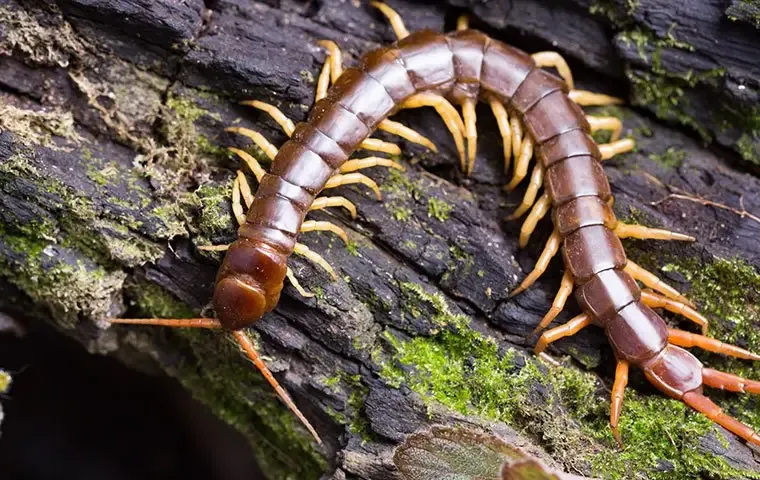Centipedes
What are centipedes?
Centipedes are often confused for millipedes, but these two pests could not be more different. Millipedes have a worm-like body, two pairs of legs per body segment, short antennae, and are herbivores, compared to centipedes, which have:
Long, flat bodies
One pair of legs per body segment
Long antennae
They are fast-moving carnivores and are usually a yellow-gray or dark brown color. Although they are pests, centipedes are beneficial because they help protect plants and crops from the pests that damage them. They also help to control other insect populations.

Are centipedes dangerous?
While they may look dangerous, centipedes are not usually considered a threat. Unless bothered, centipedes will leave you alone, making them a nuisance pest instead of a dangerous pest. Although this is true, holding one with your bare hands can lead to a painful bite. Most of the time, a centipede bite isn't strong enough to break the skin, but some people can be allergic to their venom, so monitor yourself for any reaction if bitten.
Why do I have a centipede problem?
Centipedes, like other pests, are attracted to a few factors, which include moisture, food, and entryways. The most common way pests get inside houses are cracks and gaps in the foundation; however, they can also get in through damaged screens and other weaknesses in the exterior.
Silverfish, moths, spiders, cockroaches, cricks, and other insects make up most of a centipede's diet, meaning that if you have other pest problems, you'll probably end up with centipedes too.
Where are centipedes commonly found?
As mentioned above, centipedes are predators, so they will be found in places where there are prey pests, such as gardens. Typical pest hot spots in homes are basements, bathrooms, kitchens, and garages because these areas usually have dark and damp spaces.
How do I get rid of centipedes?
For a centipede free-home, reach out to our team at Texas Termite Terminators. We provide residential pest control services for Houston area properties. These services include an inspection to identify harborage areas, conducive conditions, and entry points. Once we perform an inspection, we will perform necessary treatments and schedule follow-up visits depending on your needs.
With our assistance, you don't have to worry about centipedes and other pests in your home! Contact Texas Termite Terminators today!
How can I prevent centipedes in the future?
Aside from home pest control and commercial pest management, to keep centipedes out of your home, you can use these tips to eliminate conducive factors and entry points:
Use gutter guards or clean out gutters often so debris doesn't build up and cause clogs.
Regularly trim foliage and mow the lawn.
Keep your yard clear of debris like leaves as they hold moisture and provide harborage areas.
Eliminate entryways by filling cracks in the foundation and exterior walls.
Repair or replace any damaged screens and weatherstripping.
Address other pest issues; because centipedes are predators, they will be attracted to homes that have prey pests. Also, make sure your garden and ornamental plants don't have pests crawling on them either.
For more tips, give us a call at Texas Termite Terminators.
Get Started With Texas Termite Terminators Today
Reach out to us for immediate pest control solutions in Houston, TX, and surrounding areas.


